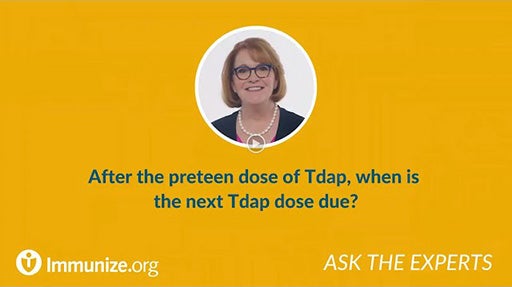In April 2018, the Advisory Committee on Immunization Practices (ACIP) published a compilation of all previous recommendations for the prevention of pertussis, tetanus, and diphtheria (MMWR 2018;678 [RR-2]:1-31). The document can be accessed on the CDC website at www.cdc.gov/mmwr/volumes/67/rr/pdfs/rr6702a1-H.pdf.
In January 2020, ACIP published updated Tdap recommendations, stating that either Td or Tdap may be used in situations where Td only was previously recommended. The document can be accessed on the CDC website at www.cdc.gov/mmwr/volumes/69/wr/pdfs/mm6903a5-H.pdf.
Last reviewed:
March 31, 2022
All children should receive a series of DTaP at ages 2, 4, and 6 months, with boosters at ages 15–18 months and at 4–6 years. The fourth dose may be given as early as age 12 months if at least 6 months have elapsed since the third dose.
Last reviewed:
March 31, 2022
The most current ACIP recommendations for Tdap can be accessed here at www.cdc.gov/mmwr/volumes/69/wr/pdfs/mm6903a5-H.pdf.
A listing of the recommendations follows:
- Tdap can be given regardless of the interval since the last Td was given. There is NO need to wait 2–5 years to administer Tdap following a dose of Td.
- Adolescents should receive a single dose of Tdap (instead of Td) at the 11–12-year-old visit.
- Adolescents and adults who have not received a dose of Tdap, or for whom vaccine status is unknown, should receive a single dose of Tdap as soon as feasible. As stated above, Tdap can be administered regardless of interval since the previous Td dose.
- Children age 7–10 years who are not fully immunized against pertussis (i.e., did not complete a series of pertussis-containing vaccine before their seventh birthday) should receive a single dose of Tdap. If needed, they should complete their series with Td or Tdap. If a Tdap dose is administered at age 10 years or older, the Tdap dose may count as the adolescent Tdap dose.
- All healthcare personnel, regardless of age, should receive a single dose of Tdap as soon as feasible if they have not previously received Tdap and regardless of the time since the last dose of Td.
- Pregnant teens and adults should receive Tdap during each pregnancy, preferably between 27- and 36-weeks’ gestation. Mothers who have never received Tdap and who do not receive it during pregnancy should receive it immediately postpartum.
- Tdap may be administered in any situations where Td only was previously recommended.
- After receiving an initial dose of Tdap, either Tdap or Td can be used to fulfill the decennial (every 10 years) Td booster dose recommendation.
Last reviewed:
March 31, 2022
Vaccine efficacy is 80%–85% following 3 doses of DTaP vaccine. Efficacy data following just 1 or 2 doses are lacking but are likely lower. The most effective way to prevent pertussis in early infancy is to vaccinate the mother between 27 and 36 weeks’ gestation. Antipertussis antibodies generated by the mother’s immune system are passed across the placenta to the fetus. One dose of Tdap should be administered during each pregnancy, preferably between 27 and 36 weeks’ gestation. Available data suggest that vaccinating closer to 27 weeks will maximize passive antibody transfer to the infant. A CDC evaluation found Tdap vaccination during the third trimester of pregnancy prevents 78% of pertussis cases in infants younger than 2 months of age and that maternal vaccination reduces the risk of infant hospitalization for pertussis by 90% (www.cdc.gov/pertussis/hcp/vaccine-recommendations/vaccinating-pregnant-patients.html).
Last reviewed:
March 31, 2022
Last reviewed:
May 9, 2023
Yes. The January 2020 ACIP updated statement on the use of Tdap (available at www.cdc.gov/mmwr/volumes/69/wr/pdfs/mm6903a5-H.pdf) states that a child who receives a dose of Tdap from age 7–9 years as part of the catch-up series (as in this case), should receive another dose of Tdap at age 11 or 12 years.
Last reviewed:
March 31, 2022
The first two doses of Td are valid because they are separated by at least 4 weeks. However, the minimum interval between the second and third doses of tetanus-containing vaccine is 6 calendar months. So, the Td component of the Tdap dose is not valid because it was given only 4 months after the second dose. The pertussis component can be counted as valid. The patient should receive another dose of Td or Tdap 6 months after the invalid Tdap dose.
Last reviewed:
March 31, 2022
If the first dose of a tetanus toxoid-containing vaccine is administered before the first birthday, 4 doses are necessary before beginning the 10-year cycle of booster doses. If the first dose is administered after the first birthday, 3 doses are necessary. The final dose should be spaced 6 months from the previous dose.
Last reviewed:
March 31, 2022
As of January 2020, ACIP recommends that Td or Tdap may be administered in any situation when only Td vaccine was previously recommended. Someone who received a dose of Tdap at age 11 or 12 years should receive a booster dose of Td or Tdap vaccine ten years later, unless tetanus prophylaxis is required sooner due to an injury or if Tdap vaccination is needed during pregnancy.
Last reviewed:
March 31, 2022
Last reviewed:
June 7, 2024
Yes. Sometimes ACIP makes recommendations that differ from the FDA-approved package insert indications, and this is one of those instances. ACIP recommendations represent the standard of care for vaccination practice in the United States.
Last reviewed:
March 31, 2022
A history of tetanus disease is not a reason to avoid tetanus-containing vaccines. Tetanus disease does not produce immunity because of the very small amount of toxin required to produce illness. As long as your patient has no other contraindications, she should receive Tdap now. If she has no documentation of prior tetanus vaccination, she should receive a complete 3-dose primary series (dose #1 of Tdap, followed by dose #2 of Td or Tdap 4–8 weeks later, and dose #3 of Td or Tdap 6–12 months after dose #2).
Last reviewed:
March 31, 2022
No. Tdap should be administered as soon as possible.
Last reviewed:
March 31, 2022
If Tdap is administered earlier in pregnancy, it should not be repeated between 27 and 36 weeks’ gestation; only one dose is recommended during each pregnancy.
Last reviewed:
October 31, 2023

